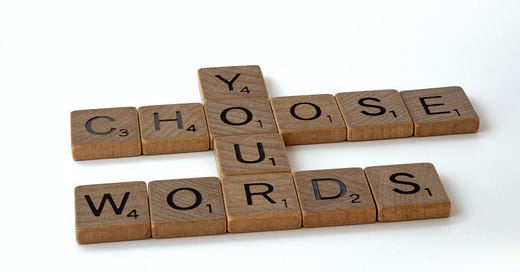In recent years, words like "narcissist," "OCD," "bipolar," and "anxiety" have been absorbed into our daily vocabulary. But as mental health terms slip into casual use, there's an unintended consequence: our language becomes less accurate, sometimes even harmful. Words that hold significant clinical weight lose meaning when we use them too liberally or apply them to behaviors rather than diagnoses. And for those of us who care about mental health awareness, it's worth asking: How can we make our language more intentional?
A word that immediately comes to mind is "narcissist," one of the most common terms tossed around in the cultural conversation. It's easy to label a difficult boss, a selfish friend, or a partner who hurt us as a "narcissist." However, "narcissist" is a clinical term that describes someone with Narcissistic Personality Disorder (NPD), a rare and specific diagnosis with distinct criteria. Using it as a catch-all for negative or selfish behavior diminishes the experiences of those who genuinely struggle with NPD and risks perpetuating stigma and misunderstanding. Using "narcissist" casually can significantly impact the conversation surrounding mental health. By conflating general selfish behaviors with a serious clinical diagnosis, we risk trivializing the experiences of those genuinely struggling with NPD and possibly villainizing them. This can create an environment where stigma thrives, making it even more difficult for those affected to seek understanding and support.
Similarly, consider the phrase, “Take off your shoes; I am super OCD.” This casual use of the term significantly oversimplifies Obsessive-Compulsive Disorder (OCD) and minimizes a condition that profoundly affects many individuals. When we use "OCD" to refer to someone’s preference for tidiness or attention to detail, we fail to recognize the complexity of the disorder.
OCD is characterized by intrusive thoughts—obsessions—that provoke intense anxiety and discomfort, leading to compulsive behaviors aimed at alleviating that anxiety. For instance, an individual might feel compelled to wash their hands repeatedly or check locks multiple times, not merely out of a desire for cleanliness or security, but to combat overwhelming fears of harm or catastrophe. These compulsions can consume hours of a person’s day, severely impairing their ability to engage in daily activities, maintain relationships, or pursue their goals.
For those living with OCD, the condition is not a quirky personality trait; it is a debilitating challenge that can lead to feelings of isolation, shame, and frustration. By reducing OCD to a mere preference for order or neatness, we overlook the struggles of those who endure the relentless cycle of obsessions and compulsions. It’s crucial to use language that accurately reflects the seriousness of OCD, fostering understanding and compassion rather than perpetuating misconceptions.
Along with mislabeling, it's important to remember that even for those who do have a diagnosis, they are not the sum of it. Phrases like "They have OCD" or "They are managing their OCD" are more accurate and respectful than "They ARE OCD." Such language encourages understanding and compassion, reminding us that mental health conditions are just one aspect of a person's life, and a diagnosis is simply a piece of information about them.
We must be mindful of our language to create a more supportive environment. Instead of casually labeling someone a "narcissist," we can acknowledge specific harmful behaviors, such as selfishness or lack of empathy, without imposing a clinical label and stigmatizing the individual. This shift encourages constructive dialogue while respecting the complexities of mental health.
Language matters. The words we choose can either empower or harm, educate or mislead. By being intentional about our language around mental health, we can foster a more compassionate understanding of ourselves and those around us. Let's strive to use language that encourages dialogue, learning, and growth rather than labels that confine and stigmatize. In doing so, we honor the lived experiences of those with mental health conditions and contribute to a more empathetic and informed society.
With Love,
Stephanie





I had a friend who used these terms frequently to diagnose herself. I used to find it so annooying but couldn't put it into words as to why i found it annoying. Thank you for putting my frustrations into words.
Great article and I think perfectly captures the current state of conversation around these terms.
My initial observation on their usage and intentions behind them are that: when it comes to incorrectly using the word OCD, it mostly comes down to ignorance, not malice, simply because people don't actually understand what OCD is.
Whereas I do think that people use the term narcissism - which has more sinister tones - maliciously, to smear others reputation (even though they may not understand what it means either but as you pointed out, is an easy catch-all word).